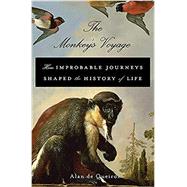Throughout the world, closely related species are found on landmasses separated by wide stretches of ocean. What explains these far-flung distributions? Why are such species found where they are across the Earth?
Since the discovery of plate tectonics, scientists have conjectured that plants and animals were scattered over the globe by riding pieces of ancient supercontinents as they broke up. In the past decade, however, that theory has foundered, as the genomic revolution has made reams of new data available. And the data has revealed an extraordinary, stranger-than-fiction story that has sparked a scientific upheaval.
In The Monkey's Voyage, biologist Alan de Queiroz describes the radical new view of how fragmented distributions came into being: frogs and mammals rode on rafts and icebergs, tiny spiders drifted on storm winds, and plant seeds were carried in the plumage of sea-going birds to create the map of life we see today. In other words, these organisms were not simply constrained by continental fate; they were the makers of their own geographic destiny. And as de Queiroz shows, the effects of oceanic dispersal have been crucial in generating the diversity of life on Earth, from monkeys and guinea pigs in South America to beech trees and kiwi birds in New Zealand. By toppling the idea that the slow process of continental drift is the main force behind the odd distributions of organisms, this theory highlights the dynamic and unpredictable nature of the history of life.
In the tradition of John McPhee's Basin and Range, The Monkey's Voyage is a beautifully told narrative that strikingly reveals the importance of contingency in history and the nature of scientific discovery.








